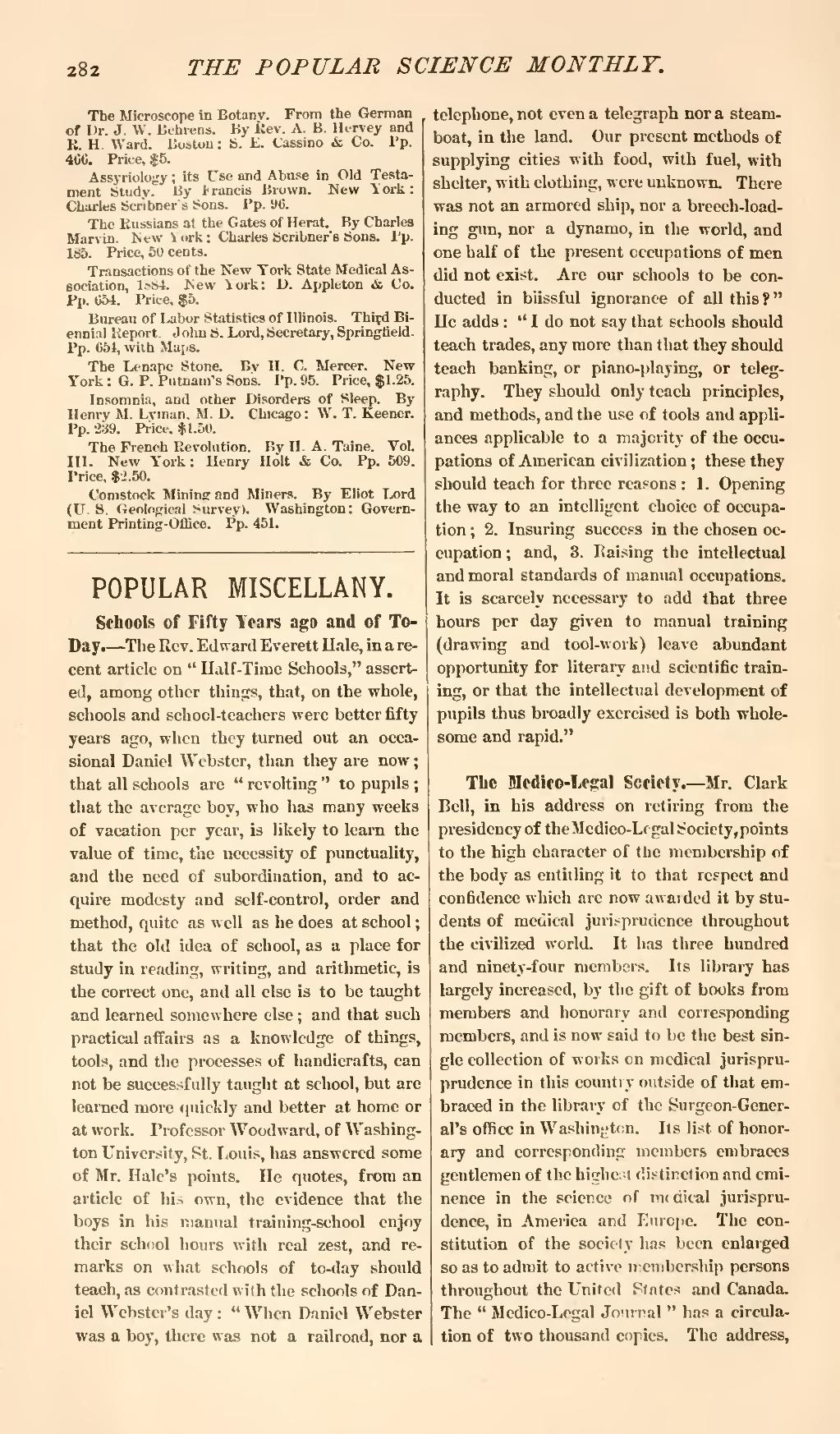The Microscope in Botany. From the German of Dr. J. W. Behrens. By Rev. A. B. Hervey and E. H. Ward. Boston: S. E. Cassino & Co. Pp. 466. Price, $5.
Assyriology; its Use and Abuse in Old Testament Study. By Francis Brown. New York: Charles Scribner's Sons. Pp. 96.
The Russians at the Gates of Herat. By Charles Marvin. New York: Charles Scribner's Sons. Pp. 185. Price, 50 cents.
Transactions of the New York State Medical Association, 1884. New York: D. Appleton & Co. Pp. 654. Price, $5.
Bureau of Labor Statistics of Illinois. Third Biennial Report. John S. Lord, Secretary, Springfield. Pp. 654, with Maps.
The Lenape Stone. By H. C. Mercer. New York: G. P. Putnam's Son's. Pp. 95. Price, $1.25.
Insomnia, and other Disorders of Sleep. By Henry M. Lyman. M. D. Chicago: W. T. Keener. Pp. 239. Price, $1.50.
The French Revolution. By H. A. Taine. Vol. III. New York: Henry Holt & Co. Pp. 509. Price, $2.50.
Comstock Mining and Miners. By Eliot Lord (U. S. Geological Survey). Washington: Government Printing-Office. Pp. 451.
POPULAR MISCELLANY.
Schools of Fifty Years ago and of To-Day.—The Rev. Edward Everett Hale, in a recent article on "Half-Time Schools," asserted, among other things, that, on the whole, schools and school-teachers were better fifty years ago, when they turned out an occasional Daniel Webster, than they are now; that all schools are "revolting" to pupils; that the average boy, who has many weeks of vacation per year, is likely to learn the value of time, the necessity of punctuality, and the need of subordination, and to acquire modesty and self-control, order and method, quite as well as he does at school; that the old idea of school, as a place for study in reading, writing, and arithmetic, is the correct one, and all else is to be taught and learned somewhere else; and that such practical affairs as a knowledge of things, tools, and the processes of handicrafts, can not be successfully taught at school, but are learned more quickly and better at home or at work. Professor Woodward, of Washington University, St. Louis, has answered some of Mr. Hale's points. He quotes, from an article of his own, the evidence that the boys in his manual training-school enjoy their school hours with real zest, and remarks on what schools of to-day should teach, as contrasted with the schools of Daniel Webster's day: "When Daniel Webster was a boy, there was not a railroad, nor a telephone, not even a telegraph nor a steam-boat, in the land. Our present methods of supplying cities with food, with fuel, with shelter, with clothing, were unknown. There was not an armored ship, nor a breech-loading gun, nor a dynamo, in the world, and one half of the present occupations of men did not exist. Are our schools to be conducted in blissful ignorance of all this?" He adds: "I do not say that schools should teach trades, any more than that they should teach banking, or piano-playing, or telegraphy. They should only teach principles, and methods, and the use of tools and appliances applicable to a majority of the occupations of American civilization; these they should teach for three reasons: 1. Opening the way to an intelligent choice of occupation; 2. Insuring success in the chosen occupation; and, 3. Raising the intellectual and moral standards of manual occupations. It is scarcely necessary to add that three hours per day given to manual training (drawing and tool-work) leave abundant opportunity for literary and scientific training, or that the intellectual development of pupils thus broadly exercised is both wholesome and rapid."
The Medico-Legal Society.—Mr. Clark Bell, in his address on retiring from the presidency of the Medico-Legal Society, points to the high character of the membership of the body as entitling it to that respect and confidence which arc now awarded it by students of medical jurisprudence throughout the civilized world. It has three hundred and ninety-four members. Its library has largely increased, by the gift of books from members and honorary and corresponding members, and is now said to be the best single collection of works on medical jurispruprudence in this county outside of that embraced in the library of the Surgeon-General's office in Washington. Its list of honorary and corresponding members embraces gentlemen of the highest distinction and eminence in the science of medical jurisprudence, in America and Europe. The constitution of the society has been enlarged so as to admit to active membership persons throughout the United States and Canada. The "Medico-Legal Journal" has a circulation of two thousand copies. The address,
